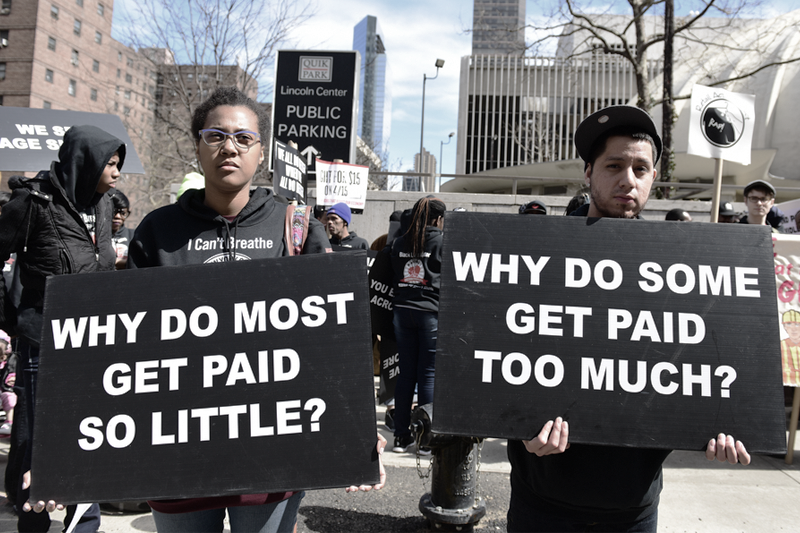NJ Proposition for $15 Minimum Wage
December 15, 2018
New Jersey has been promised a large number of progressive changes with the induction of Phil Murphy into office. Murphy ran on a platform that would create a new voter registration law, create equal pay for women, and the legalize recreational marijuana. With a majority of campaign promises unresolved or pushed back due to lack of communication and compromise with another law official, there has been little shown in the resolution of completing in the near future.
Recently the proposed bill to legalize marijuana for recreational use, as well as vast improvement for medical patients, was passed through the assembly. This is the first step in the process with the only other bill to be voted on by state legislatures. Unfortunately, due to rejections to compromise on a reasonable tax rate by Phil Murphy, the bill has been pushed back until after the new year. This is in hopes of a reasonable tax percentage to be created and agreed upon by all parties. Though, Murphy’s focus seems to have diverted from prioritizing recreational marijuana until his demands of a 25% tax is met. This has opened floor space for his most recent platform of raising the minimum wage in New Jersey from the current $8.60 to $15 incrementally throughout the new few years.

Proposition for $15 minimum wage
The current proposed bill for the increase of minimum wage, drafted by Craig Coughlin, would aim to affect a majority of workers under corporations and big box stores by 2024, while preserving the financial security for small, local, independent companies and those that employ workers under 18 until 2029. With a widespread controversy over the incorporation of a $15 minimum wage, there are areas to take from the proposed bill that will progressively increase the minimum wage year by year until the max of $15 is reached.
The proposed plan is broken down as follows:
For normal retailers, big box stores, and any company with more than 10 employees:
2019 – $9.50
2020 – $11.00
2021 – $11.55
2022 – $12.70
2023 – $13.85
2024 – $15.00
While the projected increase for farm workers, seasonal workers, teens under 18, and businesses with fewer than 10 employees will increase as follows:
2020 – $10.10
2022 – $10.35
2023 – $10.70
2024 – $11.10
2025 – $11.70
2026 – $12.45
2027 – $13.20
2028 – $14.10
2029 – $15.00
Though most other lawmakers are optimistic about the progression of this bill due to its reasonable incremental increase, Phil Murphy unsurprisingly finds overall fault with the bill. Murphy has stated his displeasure with the bill stems from the length of time it would take for citizens to reach the full $15/hour and would be willing to come to a compromise if able to be worked out. Though the allotted time for the original plan to be signed into law would come down to the next bill signing which falls on this upcoming Monday (12/17), there’s no room to effectively create a compromise when it comes to an agreed upon payment to employees. This will effectively push the bill back until after the new year as there is no listing established as of now on the legislative calendar.
The Pros and Cons of Minimum Wage
In an effort to stay unbiased regarding the discussion centering around minimum wage in New Jersey, we have compiled a list of overall pros and cons. The results were taken from Minimum Wage ProCon, an established hub for the understanding of the impact of a minimum wage increase.
Pros:
“Raising the minimum wage would increase economic activity and spur job growth” – Raising the minimum wage from the base $7.25 hour to $10.10 would effectively disperse $22.1 net billion into the economy and assist in the creation of about 85,000 jobs during a 3 year phase.
“Increasing the minimum wage would reduce poverty.”
“A higher minimum wage would reduce government welfare spending.”
“The minimum wage has not kept up with inflation.”
“Improvements in productivity and economic growth have outpaced increased in the minimum wage.”
“Increasing the minimum wage would reduce income inequality.”
Cons:
“Increasing the minimum wage would force businesses to lay off employees and raise unemployment levels.”
“Raising the minimum wage would increase poverty.”
“A minimum wage increase could hurt business and force companies to close.”
“Raising the minimum wage would increase the price of consumer goods.”
“Teenagers and young adults may be shut out of the workforce if the minimum wage is increased.”
“Raising the minimum wage would disadvantage low-skilled workers.”
As you can see there are a ton of different reasons as to why some would back the rising of the minimum wage. From boosts in the economy to an overall fair payout, people are more inclined to sympathize with the increase than not. On the other hand, justification for not raising the minimum wage holds just as high to those opposing a new bill of increase arriving. Although both have their own valid points, it’s up to the elected officials we put into power to decide on the best suit of action for the economy.




